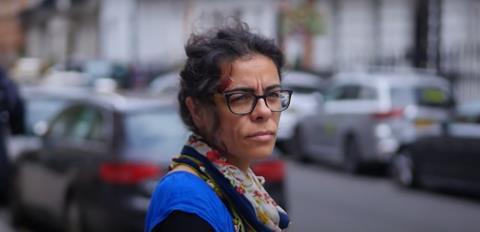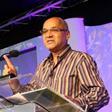Hatun Tash has been a vocal and sometimes controversial critic of Islam since her conversion to Christianity. While debating with Muslims at Speakers’ Corner last week, she was stabbed on her face and hands. Mission leader and author Steve Bell believes Hatun’s confrontational style of evangelism is biblical, and says the 39 year-old apologist deserves our respect

Hatun Tash was attacked amidst a general upsurge of strident behaviour in public discourse. Take, for instance, the racist outburst against black footballers in the Euros or the vociferous Covid anti-vaccine campaigners.
A lesser-known issue is the dramatic rise in the number of “ex-Muslims” and the pressure put on them by hardliners.
Here is some background and context which I believe goes some way in explaining why Hatun was targetted:
-
Hatun is an ex-Muslim “Christ-follower”, shunned by her family as an apostate, which is traditionally seen as worthy of death. This is precisely the sort of out-dated thinking that Hatun and other ex-Muslims are challenging.
-
Hatun openly critiques Islam with aggressive Muslims, for whom only debate is seen as valid. This suits both her personality and the cultural background she shares with such Muslims.
-
Hatun is a woman from a Muslim family, and for Muslims, the role of women is traditionally under male oversight.
-
Hatun challenges the assumptions of radicals, who can hold unfounded views about Islam which do not stand up to the scrutiny of historic fact. This has paved the way for effective reasoning with them about the claims of Christ.
-
Hatun chooses the ‘bear pit’ of Speaker’s Corner, because the debates are usually put on social media and therefore reach a global audience. Unfortunately, radical Muslims also know this and may stage an online “honour punishment” to send a signal to the thousands of Muslim viewers.
-
Hatun goes on the offence without seeking to be “offensive.” For example, she and her team once showed 26 different versions of the Qur’an to debunk the claim that the Qur’an has been preserved pristine as the verbatim word of God. This evidence to the contrary prompted one radical Muslim to put the issue, on YouTube, to the Yale-educated scholar, Yasir Qadhi, who admitted: ‘[yes] there are holes in the narrative [of the history of the Qur’an].’ This became a catchphrase for many Muslims with questions. Later, Hatun drilled symbolic holes in a Qur’an to illustrate ‘holes in the narrative’, like a ‘prophetic act.’ This sparked a vitriolic reaction worthy of Paul in the arena at Ephesus (see Acts 19). It also prompted a flood of enquiries from Muslims worldwide, which became an entrée to explain the claims of Christ. Many reportedly became Christ-followers as a result.
Why do these attacks happen?
Hatun was attacked because everything about her challenges the received Islamic status quo, which is wrestling with the issue of reform. Aggressive Muslims are uncomfortable, while many Millennial Muslims, living in a post-modern world, would agree with some of what Hatun stands for.
When asked why she endangers her life, she said: “It wasn’t convenient for Jesus to enter this world, but he was willing to be mocked and even killed to bring us truth, so I can’t pull back.” Hatun’s methods may be unorthodox (even eccentric) but, surely, we can respect her willingness to ‘count the cost’, in a Western context where personal health and safety is primary.
Combative interaction
In my book Mountains Move, I show that throughout Church history, Christians have always adhered to four main styles of gospel interaction. These are: ‘Conversation’, ‘Dialogue’, ‘Apologetics’, and ‘Confrontation.’ This is an ascending order of verbal “combat.”
We tend to gravitate to the style which suits our temperament, culture and the view of our theological tribe. What Hatun and others do at Speakers’ Corner (and on YouTube), is for specialists. I recommend the helpful resources, available online at mahabbanetwork.com. These offer a choice of resources to help us identify our style and guide us in using it.
The price of free speech
Although I do not like it, Speakers’ Corner is inevitable in any healthy liberal democracy. Freedom of speech and assembly is central to British values. The police cannot stop people exercising this civic right without a change in the law. My book exposes how our freedoms are being subtly weaponised by the secular zealots who exploit ‘political correctness’ to marginalise the Judeo-Christian heritage. White “trendy-lefties” are aided and abetted by people such as the deported radical preacher, Abu Hamza, who said: “We will use democracy to destroy democracy.” For this reason, it is not Islam, per se, that poses a threat to the British way of life, but rather “radical” or “political” or “Islamist” expressions of Islam. This is seeking to exploit the soft underbelly of Western laws.
We cannot avoid confrontation. It will come to us, whether we like it or not (see John 16:33; 2 Timothy 3:12). The question is how we respond. Debate can be a valid way to ”give account of the hope within us” (1 Peter 3:15).
Jesus and the apostle Paul modelled all the above styles of gospel interaction, but always undergirded by ‘truth’ with ‘grace’ (John 1:14). Confrontation that is in between naivety and hostility is appropriate in certain contexts and with certain individuals, whether they are aggressive atheists or assertive Muslims.
As evangelicals, it seems untenable to take the Bible seriously while criticising Christians who seek to emulate Jesus and the early apostles. Let us avoid becoming armchair critics who airbrush out the social problems posed by assertive Muslims. Our British discomfort with confrontation seems to be more “cultural” than “biblical.”




































